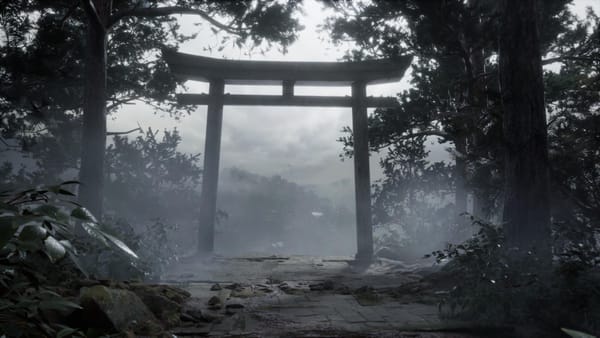What Can I Say Except Dou Itashimashite

May 2, 2025 – Austin, TX
The sky in Austin today couldn't make up its mind. Half of it looked like a dingy bedsheet, bleached and stretched, and the other a bruised knuckle, blue to almost black. Rain was coming. The kind of rain that makes you reach for something hot and comforting or, in my case, cold and chemical: a Red Bull.
I’d been up in Georgetown for an MRI, which, for those unfamiliar, is a process where you’re inserted into a very expensive tube and told not to move, breathe, or think too hard. I suppose it’s what a torpedo must feel in its final moments—contemplative and deeply magnetic.
Georgetown, if you recall, is where I met Carl the other day for lunch after a sleep study consultation. This magical city, north of Round Rock and south of Dallas, is evidently the only place you can get healthcare in Austin.
The MRI process took fifteen minutes, though time lost all meaning inside the chamber. Darude played Variations on Sandstorm through headphones that pinched the top of my skull like I was a prize in a claw machine.
Honestly? It was the most relaxing fifteen minutes I’ve had all week.
Some people are scared of getting MRIs, of being trapped in that little metal tube. Myself, I'm more concerned about the XXL scrubs I was given to wear. I’d experimented with XLs in the privacy of my own home before—who hasn’t?—but out in the wild, I prefer to keep my silhouette reasonably discernible.
An interesting moment occurred when, after dressing like Missy Elliot in the music video for her song The Rain, I was asked to turn in a circle next to a metal detector. Of course, it went off, despite being dressed only in my undies, socks, and the aforementioned light blue trash bag.
"Are you sure you don't have any metal on you? Or in you?"
There was a flicker of temptation to say, “Only my steel balls,” but I’ve lived long enough to know 2025 isn’t the year for offhand remarks about one’s genitals—especially not when the person you're speaking to is wearing a multi-color bandana over a practical ponytail.
You learn these things growing up on a military base in Japan. One: keep your head down. Two: know when to joke. And three: always say dou itashimashite when the situation calls for it, even if the situation absolutely, under no linguistic circumstances, calls for it.
“Dou itashimashite,” I muttered today—reflexively, awkwardly—at the newish H-E-B in my neighborhood as an older man named Hector bagged my groceries and massaged the rim of my Red Bull with the kind of casual intimacy usually reserved for sommeliers or the newly in love.
It wasn’t aggressive. He wasn’t licking it or anything. But his fingers were... present. Engaged. Turning the can slowly, tenderly, as if he were testing for imperfections. I didn’t mean to say anything at all, but the phrase slipped out like a startled hiccup: “Dou itashimashite.”
Now, if you didn’t grow up saying it, you might not know that dou itashimashite means “you’re welcome” in Japanese. And for my little brother and me, it sounded more like: “Don’t touch the mustache.”
I took Japanese Studies in eighth grade, or possibly ninth—it’s hard to remember, as I was emotionally unavailable both years. The class was led by Mr. Mikami, a warm and endlessly patient older Japanese man whom everyone adored. He had a smile that could disarm even the surliest teen and a genuine enthusiasm for language that made you feel bad for not caring more. He taught us dou itashimashite, and I didn’t commit it to memory because of its meaning, but because it sounded like something you might chant before casting a spell: Do. Itash. Imashte.
Like a threat whispered through a grin.
My brother and I would say it to each other whenever we didn’t want something touched. My Game Boy. His dinner. My Discman. His collection of meticulously sorted Legos. “Don’t touch the mustache,” we’d say, giggling like sociopaths. It didn’t matter what language it was in, only that it made us feel clever and vaguely superior.
So today, when Hector’s fingers lovingly rotated my can of Red Bull—a can I had very much intended to drink—it just popped out.
“Dou itashimashite,” I said.
He looked up at me. Smiled. Said, “You’re welcome.”
And I still don’t know if he was acknowledging what I said or just parroting me to avoid conflict. Either way, I didn’t mean you’re welcome. I didn’t mean thank you.
I meant: please stop fondling the rim of my beverage, Hector. Please.
Now, I bear no ill will toward Hector. He was older—sixties, if I had to guess—and his hands were no less hygienic than the next man’s. But I couldn’t help imagining the chain of commerce that led his skin to mine: bananas, dairy, a plastic sack of raw chicken, maybe a cashier’s tears hastily wiped on his apron.
And none of this would have happened at all if not for the manager.
Midway through the checkout process, this khaki-clad force of middle-management swagger appeared beside Hector and launched into a monologue that was as bizarre as it was candle-centric.
“I’m gonna bonus the shit out of you if you sell five more candles today,” he said.
Yes. Those words. In public.
“Just five, Hector. C’mon, boss. You got this.”
The candles in question sat like smelly sentries on a raised platform next to the credit card reader. I was tempted to buy one just to end the humiliation, but I feared what kind of “shit” might be “bonused” out of Hector if I did.
He didn’t say much. Just nodded, adjusted his apron, and resumed spinning my Red Bull with the same mechanical calm of a man who’s seen too many things to care anymore.
When the manager left—presumably to straighten a crooked box of Cheerios or yell the word “synergy” at a stock boy—Hector handed me the bag.
And that’s when I said it. Again. Out loud. Clear as day.
“Dou itashimashite.”
Maybe it was habit. Maybe it was protest. Maybe I just really, really didn’t want him touching my Red Bull.
Outside, the sky had given up pretending. The bruised side had won. Rain fell in earnest, and I stood under the awning, holding my bag like it contained the last hope for civilization. I considered wiping the can on my shirt, but even my shirt felt too delicate for the kind of decontamination I now required.
Back in the car, I stared at the Red Bull, contemplating whether to drink it or perform an impromptu exorcism. I was tired. Not from effort—let’s not get crazy—but from the idea of existing in the world.
What I wanted was something sweet. Something forgiving. A tiramisu for me and you.
What I had was a contaminated energy drink and cloudy weather.
If only I carried bleach.
If only Hector hadn’t touched the mustache.




